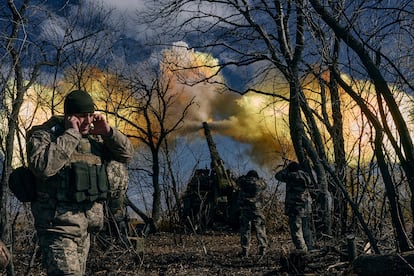Russian fighter jet hits US drone over Black Sea
Tuesday’s incident appeared to mark the first time since the height of the Cold War when a US aircraft was brought down by a Russian warplane

A Russian fighter jet on Tuesday struck the propeller of a US surveillance drone over the Black Sea, causing American forces to bring down the unmanned aerial vehicle in international waters, the US military said, an incident that highlighted soaring US-Russian tensions over Moscow’s war in Ukraine.
White House National Security spokesman John Kirby said US President Joe Biden was briefed on the incident by national security adviser Jake Sullivan. Kirby added that US State Department officials would be speaking directly with their Russian counterparts and “expressing our concerns over this unsafe and unprofessional intercept.”
Tuesday’s incident appeared to mark the first time since the height of the Cold War when a US aircraft was brought down by a Russian warplane.
The US European Command said in a statement that two Russian Su-27 fighter jets “conducted an unsafe and unprofessional intercept” of a US MQ-9 drone that was operating within international airspace over the Black Sea.
It said one of the Russian fighters “struck the propeller of the MQ-9, causing US forces to have to bring the MQ-9 down in international waters.” Prior to that, the Su-27s dumped fuel on and flew in front of the MQ-9 several times before the collision in “a reckless, environmentally unsound and unprofessional manner,” the US European Command said in a statement from Stuttgart, Germany
“This incident demonstrates a lack of competence in addition to being unsafe and unprofessional,” it added.
US Air Force General James B. Hecker, commander of US Air Forces Europe and Air Forces Africa, said that the MQ-9 aircraft was “conducting routine operations in international airspace when it was intercepted and hit by a Russian aircraft, resulting in a crash and complete loss of the MQ-9.” He added that “in fact, this unsafe and unprofessional act by the Russians nearly caused both aircraft to crash.”
There was no immediate reaction from Moscow, which has repeatedly voiced concern about US intelligence flights close to the Crimean Peninsula, which Russia illegally annexed from Ukraine in 2014. The Kremlin has charged that by providing weapons to Ukraine and sharing intelligence information with Kyiv, the US and its allies have effectively become engaged in the conflict.
Kirby emphasized that the incident wouldn’t deter the US from continuing their missions in the area.
“if the message is that they want to deter or dissuade us from flying, and operating in international airspace, over the Black Sea, then that message will fail,” Kirby said, adding “that is not going to happen.”
“We’re going to continue to fly and operate in international airspace over international waters,” he said. “The Black Sea belongs to no one nation.”
The US European Command noted that Tuesday’s incident followed a pattern of dangerous actions by Russian pilots while interacting with US and Allied aircraft over international airspace, including over the Black Sea.
“These aggressive actions by Russian aircrew are dangerous and could lead to miscalculation and unintended escalation,” it warned.
General David Berger, commandant of the Marine Corps, said that this type of collision is his greatest concern, both in that area of Europe as well as in the Pacific.
“Probably my biggest worry both there and in the Pacific is an aggressive Russia or China pilot or vessel captain, or something gets too close, doesn’t realize where they are, and causes a collision,” Berger said, in response to a question at a National Press Club event on Tuesday.
He said that whether an incident is intentional or not, it forces nation’s leaders to try and sort it out quickly from afar.
Sign up for our weekly newsletter to get more English-language news coverage from EL PAÍS USA Edition
Tu suscripción se está usando en otro dispositivo
¿Quieres añadir otro usuario a tu suscripción?
Si continúas leyendo en este dispositivo, no se podrá leer en el otro.
FlechaTu suscripción se está usando en otro dispositivo y solo puedes acceder a EL PAÍS desde un dispositivo a la vez.
Si quieres compartir tu cuenta, cambia tu suscripción a la modalidad Premium, así podrás añadir otro usuario. Cada uno accederá con su propia cuenta de email, lo que os permitirá personalizar vuestra experiencia en EL PAÍS.
¿Tienes una suscripción de empresa? Accede aquí para contratar más cuentas.
En el caso de no saber quién está usando tu cuenta, te recomendamos cambiar tu contraseña aquí.
Si decides continuar compartiendo tu cuenta, este mensaje se mostrará en tu dispositivo y en el de la otra persona que está usando tu cuenta de forma indefinida, afectando a tu experiencia de lectura. Puedes consultar aquí los términos y condiciones de la suscripción digital.








































